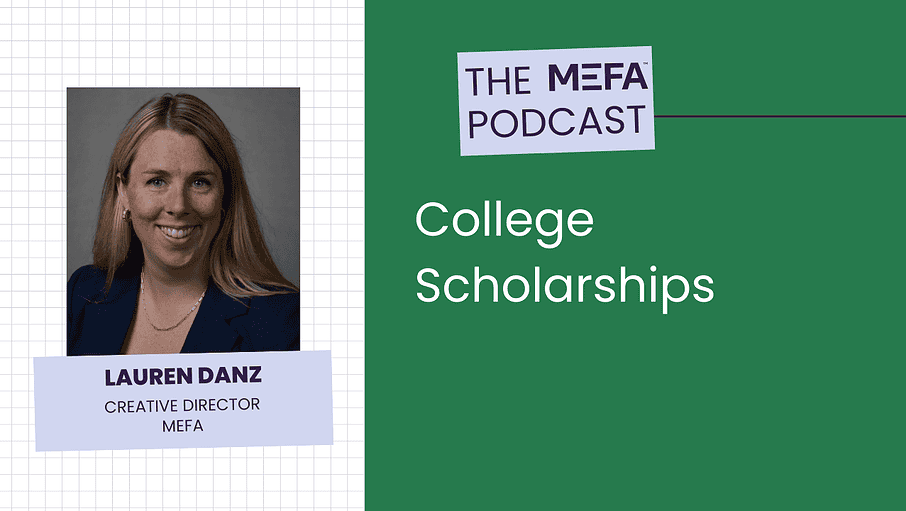

Resources Mentioned in the Episode
Jonathan Hughes: [00:00:00] Hello everyone. And welcome to the MIFA podcast. My name is Jonathan Hughes
Julie Shields-Rutyna: And I’m Julie Shields-Rutyna.
Jonathan Hughes: Hey Julie, how’s it going?
Julie Shields-Rutyna: Hey, great.
Jonathan Hughes: So we have a great show for you today. Everyone is gonna wanna hear this episode. I know, because this one is all about scholarships. That’s right. So it’s everyone’s favorite topic.
Free money to pay for college. Where do you find scholarships? How do you apply? What are some good strategies? Well, MFA’s digital creative content manager. Lauren Patten has written much on the topic over at mefa.org will be here to talk about us about all of those things. So stick around for that. You’re gonna want to hear it. What else is new Julie?
Julie Shields-Rutyna: Well, why don’t we just mention that if you’re here to learn about scholarships, we have other items on mefa.org right now that may interest you. [00:01:00] Should we go over some of those?
Jonathan Hughes: It sounds like a good idea.
Julie Shields-Rutyna: So we update mefa.org with new blog posts every week, written by professionals from within MEFA and outside of our organization.
So if you visit mefa.org and you sign up for our emails, you’ll get specially crafted timely messages for your family based on the age or grade level of your student or students. So you don’t have to keep checking the website to see what’s new for you. So an example is just last week, we sent out blog posts to families and students on topics like four websites where you can rent or buy college textbooks. What to know about borrowing a me alone. And what do you know, scholarships for minority students and scholarships with September deadlines
Jonathan Hughes: Yes. We’ll hear about that later on. So it, but it’s not just blogs, right?
Julie Shields-Rutyna: No, exactly. So another [00:02:00] really important item on our website, I think for families is that we list all of the upcoming MEFA webinars. So for example, on August 24th, we have one on college, admissions. So, if you’d like to attend, you go to the website mefa.org/events, and you just register on the website and hopefully you can attend and view the, the, webinar live and have conversation. But even if you can’t make the live webinar We will send you, send you the recording and you could always find the recordings of past webinars on mefa.org.
You could also access tools, calculators, like our loan repayment. Calculator is a great one. Our college cost estimator is another good one. And for families of younger students, we have MEFA’s interactive college planning tool that helps families estimate how much money they should save on a monthly basis for their child’s [00:03:00] education to reach their goal.
We, also have every podcast episode we’ve ever done on the website. So you can go back and listen to any episodes you may have missed. Well, one more thing I’ll say is that, you will find on the website how to contact the college planning team at MEFA. In case you’d like to have a one-on-one appointment over zoom.
So that’s something a lot of families and students can take advantage of, especially in the weeks leading up to the beginning of the school year. And also right after financial aid officer sent out. So, but any time, really, those are, those are times when when we receive a lot of calls to schedule those appointments. So I just wanted to call people’s attention to that, that that’s they can always do that. And we can talk with you about any topic related to planning, saving, and paying for.
Jonathan Hughes: Yeah, thanks. I, I really like those meetings. Actually. One of my favorite things that I get to do is meet with families. So, thanks for mentioning that. Now we will head to the MEFA mail bag and these are questions that have come in from [00:04:00] customers over the past couple of weeks and answered by our college guidance experts. And remember, if you have any questions, you can reach out to us at [email protected], or you can call us at 1-800-449-MEFA. You can also reach us on social media on Facebook at @MEFAMA Twitter at, @MEFATweets and Instagram at, @MEFA_MA, today’s question comes to us from Katie and she writes, my son will be 24 in August. He’ll be a senior in college. This fall, my son’s college. A new one is he is transfer student. This fall told me that he’s no longer eligible for the parent plus loan. His current college never told me that information and I don’t see it on the website. Is that true if he’s going to be an undergraduate and has been consecutively attending for three years, can I still use a parent plus loan for his last [00:05:00] year? So a tricky one today.
Julie Shields-Rutyna: So that is tricky. And I feel, you know, I feel bad for this family that, that, you know, they’re just coming upon that information now. But the truth is, 24 is a big cutoff age for federal financial aid. So. When a student turns 24, they go in the eyes of the federal government for financial aid, from being dependent to independent. And so that eligibility then for the parents to be able to take a, a parent plus loan for that student does go away. When the student turns 24.
Jonathan Hughes: Hmm.
Julie Shields-Rutyna: So, but colleges know that and , understand that that can be an issue. So I guess, I would, I would advise that they call the college, talk through that situation and ask about some other options. And families can always call MEFA and talk to a college planning expert and talk about some other options as well.
Jonathan Hughes: The first thing I think of was isn’t there a [00:06:00] plus that the student can borrow, but that’s a graduate plus loan. Is that right?
Julie Shields-Rutyna: Yes. So when a student becomes a graduate student, they have other options for borrowing on their own too.
Jonathan Hughes: All right. Remember if you have any questions you can call us up at 1-800-449-MEFA or email us at [email protected]. We have a bunch of college guidance experts waiting to answer your question. Now let’s bring onto the show. MFA’s digital creative content manager. Lauren Patton to talk about scholarships, Lauren.
Lauren Patten: Hello? What do they say on the radio shows? first time, long
Jonathan Hughes: no, that’s, that’s true. You’ve heard every single episode we’ve ever done.
Lauren Patten: I know
Jonathan Hughes: I should’ve actually introduced to you as the editor of the show too. You, you worked for a long time as the editor of the show,
Lauren Patten: I guess. Yeah, but that’s, you know, that’s really you now.
Jonathan Hughes: Lauren, let me ask you first. How can MEFA assist students looking for scholarships?
Lauren Patten: Yeah. So MEFA has a [00:07:00] lot of blog posts out there with scholarship opportunities. So we have some that are based on a theme, like scholarships for nursing students or scholarships for younger students. And then some of them are based on a deadline. So like scholarships that have deadlines in September. And then we also have blog posts that are really just tips on how to like start the scholarship search, how to apply. And then we promote all those blog posts in our emails and on our social media channels. So you should definitely sign up for me for emails and follow us on social media if you’re not already. And then we also have a scholarship search engine on MEFA Pathway, our college and career planning portal. So students can make an account there and take advantage of that resource too.
Jonathan Hughes: I, I know that a lot of scholarships, specific scholarships reach out to us. To, to promote their scholarships, which we do on our social channels, right?
Lauren Patten: Yes. Yeah. Usually what we’ll do [00:08:00] is we’ll take that one specific scholarship and we’ll put it into one of the larger blog posts and then that blog gets promoted on social media.
Julie Shields-Rutyna: One of the questions we get a lot of times from students and parents alike is when can they start applying for scholarships?
Lauren Patten: Really, a lot of scholarships are for they start in high school. So really, you know, freshman year you can start applying and keep going all through high school. But then there are some scholarships that you can apply as early as elementary school. There’s some out there for children. and then I think people also forget that you can keep applying once you get to college. Most of the scholarships are open to college students too. So it’s not, you know, if you miss the boat, didn’t apply in high school and you’re in college now. It’s not too late to apply for some new ones.
Jonathan Hughes: Hmm. I, I didn’t know that I, you know, I don’t know a lot about scholarships. I know a few things about scholarships. One of the things that I, I do know is that the way we talk about scholarships at MEFA [00:09:00] to folks that there are two general types. So can you explain what those two general types of scholarships are and how to search for.
Lauren Patten: Yeah. So the two types are really local and national scholarships so high school counselors are probably your best bet to consult for local scholarships.
You can also check the websites of local organizations like an Elks club or rotary club, maybe to PTA and local scholarships tend to have a smaller pool of applicants, which is good, cuz that means you have a better chance of winning. And then national scholarships. There’s a lot more competition, but they also sometimes have higher prize amounts.
So it’s definitely worth it to apply for some of those two in the best place to look for those, are usually online search engines. So there’s a ton of those out there. They’re all pretty good, but students should definitely never pay to get a scholarship search done cuz there’s so many great free resources out.
Julie Shields-Rutyna: I’ve heard some families really [00:10:00] pinning their hopes on a scholarship or scholarships that, that are gonna cover the total cost of college. Can you tell us the likelihood of that?
Lauren Patten: Yeah, so scholarships can be an important part of the college financing puzzle, but it’s important to be realistic about how much they’ll cover and how competitive they can be to earn. It’s very rare that a scholarship will cover the complete cost of college. And according to mark kreitz who analyzed the 2015-2016 national post-secondary student aid study. Only 2.7% of students will receive an award covering 90% of the cost of attendance. And of all undergraduate students only 0.1% received $25,000 or more in scholarships. So students should apply for scholarships, but it’s also important that the family applies for financial aid and completes the FAFSA. As most people need additional [00:11:00] resources to pay the full bill.
Jonathan Hughes: So 0.1% of students. Point one received $25,000 in scholarships or more. And this is outside scholarships, right? Not scholarships from the college. Cuz that’s another thing that we should say is that, you know, in the process of doing your financial aid forms, You can qualify for scholarships from colleges which is separate from what we’re talking about here.
Lauren Patten: Yes. Yes. So this is all looking at, yes. Outside private scholarships. Um okay. But yeah, yeah, only that 0.1%.
Jonathan Hughes: So, so knowing that those types of scholarships are rare, what is the message on applying for scholarships then for student.
Lauren Patten: Yeah. So, we often hear the mantra. There are scholarship opportunities available for everyone, and this is true, organizations across the country, both local and national. Offer scholarship opportunities for students who have an interest [00:12:00] in specific majors, are members of underrepresented groups or have a specific interest. And many private scholarships awards are in smaller increments. So maybe $50 to $500. And they, you know, maybe these organizations don’t have a huge scholarship budget, but they do really wanna help their local students. So students should really just be persistent and cast a wide net, , and, you know, apply for scholarships that you are likely to receive ones that line up with your extra curricular activities, your interest or your job.
Julie Shields-Rutyna: So speaking of being persistent, what’s involved in applying for all of these scholarships and how should students handle all that work with everything else they’re they have going on?
Lauren Patten: Yeah, so students, should try to stay organized. , maybe that means creating a spreadsheet that has deadlines and requirements for scholarship. Start local and then branch out to national [00:13:00] scholarships. look at the online search engines. And when you’re looking, it’s definitely helpful to create an account on the website, even though it’s more work upfront, it’s easier in the long run. Since you don’t have to, re-enter your information for every scholarship you want to apply to. And that way the website can also offer you personalized recommendations. That will be a good fit for you.
Jonathan Hughes: I’ve spoken with students who applied for a lot of scholarships. One thing that that has come across is that there can be a lot of writing involved when you’re applying for scholarships that a lot of scholarships require essays. Can you give any tips on how to handle, the essay writing for these scholarship application?
Lauren Patten: Yeah. So most scholarship applications do involve writing an essay. And if you’re going to be persistent and caster wide net, that means you could be writing a lot of essays. But what you can probably do is use one essay for multiple applications and just [00:14:00] tweak it a little bit each time. So it fits the prompt. Also keep in mind that if a scholarship requires an essay, it usually means less students are applying to it because they don’t wanna take the time to write that essay. So those scholarships tend to have less competition, which makes them a really good opportunity.
Julie Shields-Rutyna: All right. So I guess one more time. Let’s give people something to do here. Right? Action. if you want more info on scholarships, what can you do?.
Lauren Patten: So definitely follow MEFA on our Instagram account, our Facebook, our Twitter, and sign up for our emails. So that way you can be notified as soon as we have a new blog post all about scholarships. you can also go to mefa.org and view the scholarship category on our blog to see all of the recent posts and students should also create a MIFA pathway account so they can use that really great scholar. Search engine there.
Jonathan Hughes: Alright. Well, thank you so much, Lauren. That about wraps it up for us today. And remember if [00:15:00] you like the show today and you want to hear more from MEFA on all topics related to planning, saving, and paying for college and career readiness. Please subscribe to us on apple podcast, Stitcher, iHeartRadio, wherever you get your show from, and whether you’re a new or regular listener, please remember to rate and review us so we can keep doing what we’re doing and getting this information people like you. Thank you to Julie.
Julie Shields-Rutyna: Thank you, Jonathan. And thank you, Lauren.
Yes. Thank you to, editor I’m. I told you I would refer to you as editor newlywed Lauren Patten. Thank you to our producer, Shaun Connolly. Once again, my name is Jonathan Hughes and this has been the MEFA podcast. Thank you.











